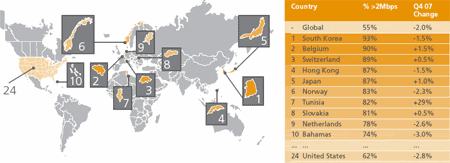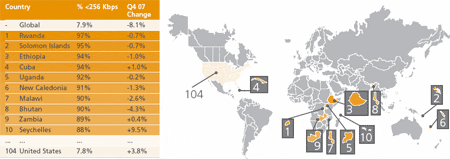Akamai: Internet Status Report
Akamai, the largest CDN provider, first published an Internet status report . This interesting document touches on various topics, including security, Internet network infrastructure, connection speed, geographical distribution of traffic, network penetration in different countries. All the largest virus outbreaks, network attacks and infrastructure outages in the first quarter are listed. 2008 year.
Here are some facts:
 China ranks first in the world in terms of malicious traffic, which includes DDoS attacks as well. Among the leaders are Taiwan and Venezuela, and Russia is absent even in the top ten.
China ranks first in the world in terms of malicious traffic, which includes DDoS attacks as well. Among the leaders are Taiwan and Venezuela, and Russia is absent even in the top ten.
About 30% of all attacks target 135 port, which is designed for remote procedure call in Windows (see table on the right).
In March 2008, more than 10,000 web pages on hundreds of sites were infected by hackers in order to entice passwords for popular online games.
In the first quarter of 2008, the Internet grew by 329 million unique IP addresses. Now for every 20 inhabitants of the Earth there is one IP address.
In one quarter, the number of unique IPs increased by 5.3% to 329 million. Among the largest countries, China is the leader in terms of Internet growth (+ 7.6% of new addresses; only 32.4 million), but in the total number of devices connected to the Network the first place so far reliably held by the United States: 96.8 million
If you divide the number of IP addresses by population, then no one can compare with the Scandinavian countries: Sweden (0.4 IP addresses per capita), Norway, Iceland (0.37 each) and Finland (0.35). The honorable sixth place is occupied by the Cayman Islands (0.34). America is only in eighth place (0.32), and the global average is 0.05.
The fastest Internet, as before, in South Korea and Japan. There, 64% and 48% of users, respectively, are connected to the Network at a speed of more than 5 Mbps. Interestingly, the ninth place in the world for this indicator is Nepal.

In terms of the number of “high-speed” IP addresses per capita, the picture of leaders is approximately the same.
But if you reduce the speed limit a little to 2 Mbps, the picture becomes a little more objective: two European countries fall into the top three in terms of the share of broadband Internet among users: Belgium and Switzerland. In the top ten, we also see Tunisia, Slovakia and the Bahamas, and the United States sank to a distant 24th place.

By the number of IP addresses with a speed of more than 2 Mbit / s per capita, the dominance of Europe is simply overwhelming: all ten first places in the world belong to European countries.
Only those countries in which users are forced to use dial-ups and very slow Internet at speeds less than 256 Kbps are only sympathetic. The share of such Internet connections is minuscule: only 7.9%. But in some countries there are most of them. These sufferers: Rwanda, Ethiopia, Cuba, etc.

Here are some facts:
 China ranks first in the world in terms of malicious traffic, which includes DDoS attacks as well. Among the leaders are Taiwan and Venezuela, and Russia is absent even in the top ten.
China ranks first in the world in terms of malicious traffic, which includes DDoS attacks as well. Among the leaders are Taiwan and Venezuela, and Russia is absent even in the top ten. About 30% of all attacks target 135 port, which is designed for remote procedure call in Windows (see table on the right).
In March 2008, more than 10,000 web pages on hundreds of sites were infected by hackers in order to entice passwords for popular online games.
In the first quarter of 2008, the Internet grew by 329 million unique IP addresses. Now for every 20 inhabitants of the Earth there is one IP address.
In one quarter, the number of unique IPs increased by 5.3% to 329 million. Among the largest countries, China is the leader in terms of Internet growth (+ 7.6% of new addresses; only 32.4 million), but in the total number of devices connected to the Network the first place so far reliably held by the United States: 96.8 million
If you divide the number of IP addresses by population, then no one can compare with the Scandinavian countries: Sweden (0.4 IP addresses per capita), Norway, Iceland (0.37 each) and Finland (0.35). The honorable sixth place is occupied by the Cayman Islands (0.34). America is only in eighth place (0.32), and the global average is 0.05.
The fastest Internet, as before, in South Korea and Japan. There, 64% and 48% of users, respectively, are connected to the Network at a speed of more than 5 Mbps. Interestingly, the ninth place in the world for this indicator is Nepal.

In terms of the number of “high-speed” IP addresses per capita, the picture of leaders is approximately the same.
But if you reduce the speed limit a little to 2 Mbps, the picture becomes a little more objective: two European countries fall into the top three in terms of the share of broadband Internet among users: Belgium and Switzerland. In the top ten, we also see Tunisia, Slovakia and the Bahamas, and the United States sank to a distant 24th place.

By the number of IP addresses with a speed of more than 2 Mbit / s per capita, the dominance of Europe is simply overwhelming: all ten first places in the world belong to European countries.
Only those countries in which users are forced to use dial-ups and very slow Internet at speeds less than 256 Kbps are only sympathetic. The share of such Internet connections is minuscule: only 7.9%. But in some countries there are most of them. These sufferers: Rwanda, Ethiopia, Cuba, etc.

